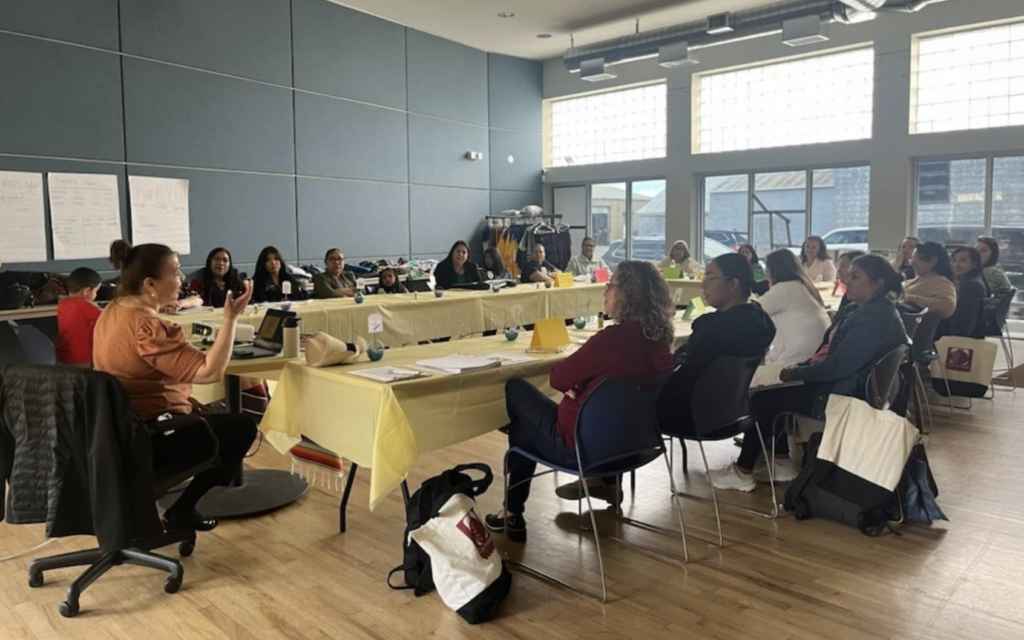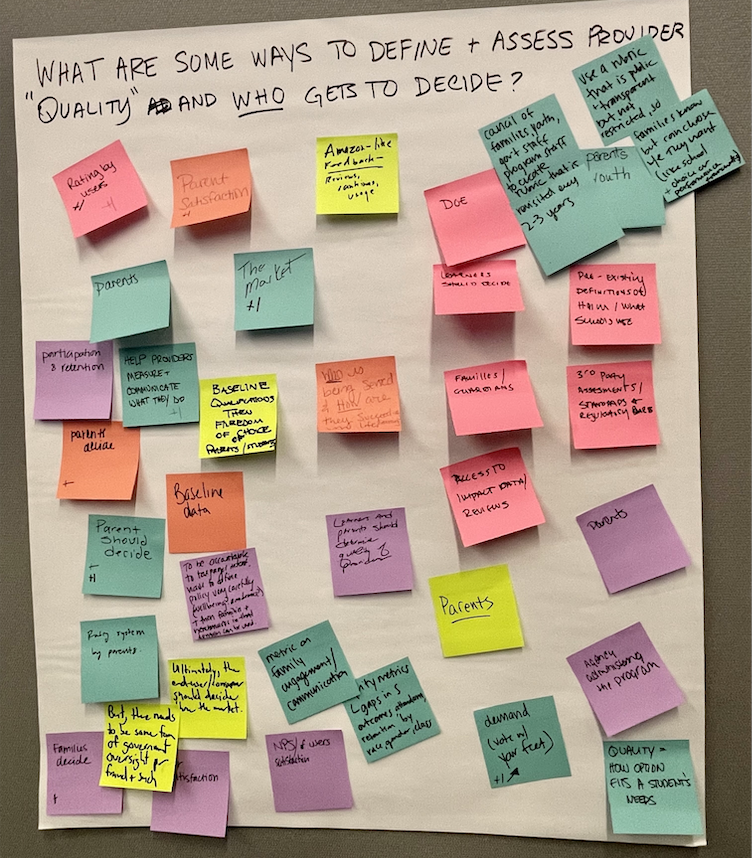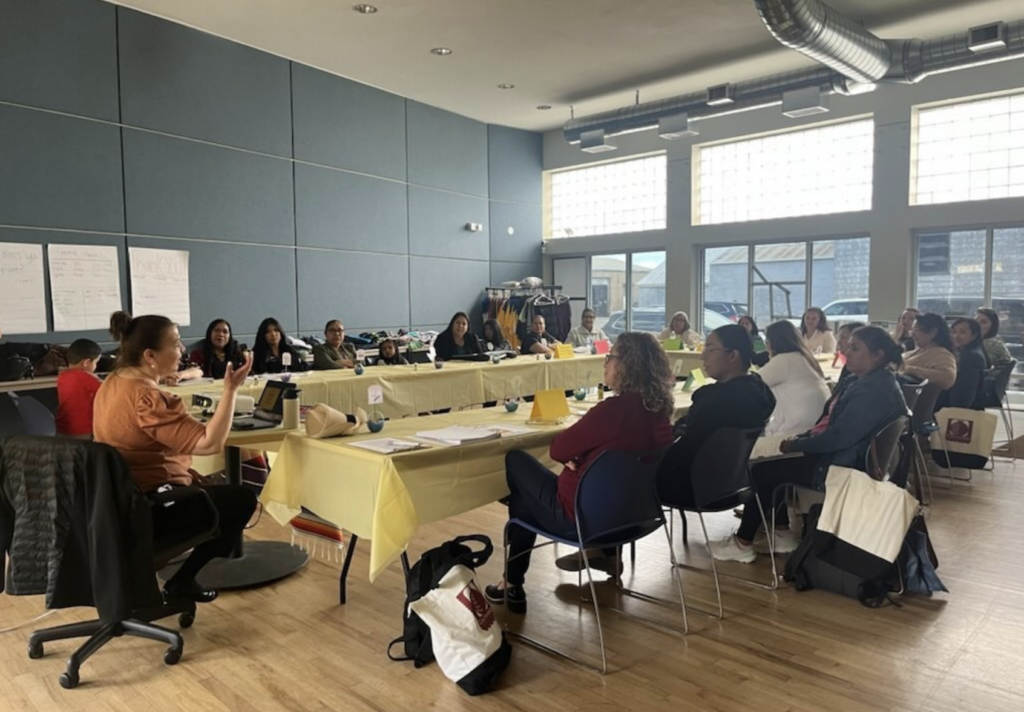What does creating “wins” for students and families as they navigate current educational landscapes and community-wide learning opportunities look like? Who gets to decide what a “win” is, and what processes and infrastructures get designed during this decision-making? In April 2024, roughly 30 nonprofit leaders, educational providers, and funders from across the country gathered in Denver, CO to explore these questions and more. This convening, “Funding Families in the Mountain West,” was created as a collaboration between Bellwether, RESCHOOL, and the Donnell-Kay Foundation to offer space for attendees to share about, grapple with, and learn from the challenges and opportunities in getting flexible funding to families and young people to participate in a variety of learning opportunities both in and outside of the classroom.
The convening kicked off with participants engaging in a few rounds of REVOLVE, a game designed to encourage players to step outside their everyday routines to gain more perspectives when identifying and creating more expansive learning opportunities alongside learners. As attendees explored multiple vantage points of navigating through a variety of decisions many young people encounter in childhood and adulthood (similar to the ones participants themselves may have experienced in their own upbringing), attendees rooted themselves in empathy, curiosity, and exploration to kick off the topics covered in the sessions throughout the convening.
Program Design and Administration
From statewide initiatives to citywide collaboratives and nonprofit programs, participants engaged in lively discussions that offered insights into how different geographies have designed and administered programs that provide youth and families with direct cash to pursue varied learning experiences. By first digging into an overview of the promises and tensions faced more broadly in the national landscape of microgrants for supplemental (out-of-school) learning and education savings accounts, Yes Every Kid led us through the ins and outs of various policy and implementation considerations. These included building consensus on language and policy descriptions around matters of eligibility (in both incomes and approved uses of funds), determining accessible ways to distribute funds to families (via debit cards, wallet platforms, etc.), and adequately building capacity within programs to meet the evolving needs of families and youth in changing educational landscapes.
We then heard about programmatic efforts in three Mountain West states—Colorado, Idaho, and Utah—and some of the strengths and challenges they have encountered. In Colorado, we heard from the My Spark Program – a $5 million Denver-based microgrant program built on the belief that afterschool programs and enrichment opportunities are must-haves and not nice-to-haves. Through this public and philanthropic partnership, 4,000 youth in low-income households receive $1,000 each for out-of-school programming. Similarly, RESCHOOL’s Learning Dollars Program leverages the flexibility of philanthropic dollars and strategic community-based partnerships to invest resources in families and young people as they explore learning opportunities in their communities. In hearing from those close to Idaho’s Empowering Parents Grant Program, a $50 million statewide microgrant serving about 20,000 students each year, we learned about how this evolving initiative got its start as a philanthropic effort determined to support Idaho’s youth in addressing learning loss due to Covid impact. To round out this session, we heard from Utah Fits All about the importance of grassroots efforts consisting of statewide parent awareness campaigns in securing scholarship funding that families across income levels can access, up to $8000 per child.
As attendees learned more about each program, discussions about the challenges and tensions emerged about how to best ensure equitable opportunities for families and young people to engage meaningfully in these programs, how to keep up with the flexible and iterative nature of educational landscapes, how to continuously fund these kinds of programs at the state and local level, and how to build robust provider ecosystems that meet the needs and wants of families.
Accessibility, context, and trust
Designing programs that reflect young people’s and families’ needs and wants requires developing deep trust and ensuring accessibility across ability, language, and technology. The role that community-focused organizations play in supporting young people and families as they navigate the growing complexities of educational provider landscapes cannot be understated. During this part of the day, we heard from family-facing organizations in Arizona and Colorado, NavigateED, RESCHOOL, and Love Your School, about the considerations families make when engaging with their programs, the more extensive education and learning resources available to them, and the measures of accountability organizations employ to ensure privacy of sensitive information. Each organization described the demographic ranges of their constituents, which varied in terms of socioeconomic class (with a concerted effort to serve low-income families), race and ethnicity (majority Latinx communities), and disability status. From supporting families in designing their own community-centered learning solutions to providing pathways to support access to mental health resources, these organizations described how their work is rooted in contextualized approaches to supporting families as they navigate complex learning environments.
Leaders from these organizations also mentioned their role in supporting parents in extending learning at home, such as cooking or learning instruments, by engaging their children in out-of-school experiences that expand and reinforce those learnings. Some challenges raised during this panel were finding the right balance between amplifying platforms for families to share their stories with the broader public and ensuring that all storytelling efforts are rooted in respect and integrity while accounting for potential harms of tokenization, extraction, and privacy breaches. Embedding families and young people in the process of how they would want to share their experiences, in what language, and the kinds of questions even considered were all offered as ways to help build and sustain trust with constituents while working on systemic efforts to improve more equitable access to expansive learning opportunities.
Building and sustaining thriving learning ecosystems
Building and sustaining robust landscapes of responsive educational providers who are attuned to the needs and wants of young people and families is crucial. Ensuring that families can adequately find and access relevant programming requires coordinated efforts. Many of these aspects were highlighted during a panel focused on supporting the equitable ecosystems of educational providers and technology providers whose platforms enable families to spend their funds. We heard from Moonshot edVentures, a Denver-based organization working to co-create equitable educational provider ecosystems that reflect the diversity of youth and communities, about how they help equity-driven leaders launch community-centered learning solutions that span a variety of formats and models. Outschool.org shared many of the learnings they have had in working with states and districts to support families in accessing and spending funding made available as part of new initiatives and raised larger questions for participants around navigation and accountability in how funds are implemented and supported. To round out this discussion, we also heard from Merit about the importance of data sharing and continuous learning amongst technology platform providers as new approaches continue to be explored in getting funding directly to families in ways that are as flexible and user-friendly as possible.
Overall, this panel highlighted the importance of solid data infrastructures and feedback loops, which can better inform decision-making and incentives across stakeholders by prioritizing ways to ensure that real-time learnings are applied iteratively. Furthermore, it highlighted how much due diligence and time is required to cultivate educational provider ecosystems, the importance of providing proper navigational support to families, and creating timely feedback loops between stakeholders. Continuing to parse out how to get resources to families equitably requires deep commitment from educational providers, program administrators, and technology providers alike, and digging into this session opened up many possibilities for exploring this further.
Summary
By the end of the convening and after multiple discussions, it was clear that it takes an ecosystem of players across states, cities, and local communities committed to cross-sector partnerships to ensure that all children can access meaningful learning opportunities both in and out of school. Ensuring deep investments in low-income families and designing infrastructural supports that can equitably expand access to learning experiences across socio-economic status is critical to ensuring that opportunity is not limited by income or race. Furthermore, encouraging educational providers, program administrators, and technology providers to commit to sharing information and learning together from implementation about what is working as expected and what isn’t, and pivoting when possible can help support more equitable learning environments that reflect greater accessibility and culturally contextual programming. As attendees of the convening wrestled with significant questions in pursuit of creating more opportunities in partnership with families, each likely left with more questions and more avenues of exploration to uncover.



